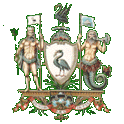

Last Updated : 31 Aug 2009
People
Pre-1900 People
Actors
Comedians
Contact Me
 After the Great Fire of London in 1666, Allyn Smith decided to relocate his sugar business to Liverpool, where Thomas Clayton and Richard Cleiveland had opened trade with the West Indies. Smith’s son (also Allyn) together with Cleiveland and Daniel Danvers established Liverpool’s sugar house in 1673.
After the Great Fire of London in 1666, Allyn Smith decided to relocate his sugar business to Liverpool, where Thomas Clayton and Richard Cleiveland had opened trade with the West Indies. Smith’s son (also Allyn) together with Cleiveland and Daniel Danvers established Liverpool’s sugar house in 1673.
Henry Tate was born in Lancashire in 1819, the son of the Rev. William Tate and Agnes Booth. When Henry was 13 he entered the grocery trade in Liverpool where one of his older brothers Caleb was already. At the age of twenty he acquired Aaron Wedgewood’s business at Old Haymarket and became a master grocer. In 1847 he opened a second shop at Oldhall Street and in 1849 in James Street. By 1855, he had opened his sixth shop in the area in Fox Street and later a wholesalers in Moor Street.
 Henry was interested in entering the sugar refining business and in 1859 he became a partner in John Wright & Co of Manesty Lane. A small refinery of “Henry Tate & Co,” was later opened in Earl Street. Eventually in the face of increasing competition in the business and Henry’s drive for more cost efficiency, work started on a new refinery at Love Lane in 1870. By the mid 1870’s Henry looked at expanding his business to London where he built the Thames Refinery. Henry introduced ‘Tate’s Cubes’ which replaced the earlier ‘sugar-loaf’ in British homes and became world famous. Henry made a fortune from his enterprise but he never forgot the deficiencies of the social system of his youth.
Henry was interested in entering the sugar refining business and in 1859 he became a partner in John Wright & Co of Manesty Lane. A small refinery of “Henry Tate & Co,” was later opened in Earl Street. Eventually in the face of increasing competition in the business and Henry’s drive for more cost efficiency, work started on a new refinery at Love Lane in 1870. By the mid 1870’s Henry looked at expanding his business to London where he built the Thames Refinery. Henry introduced ‘Tate’s Cubes’ which replaced the earlier ‘sugar-loaf’ in British homes and became world famous. Henry made a fortune from his enterprise but he never forgot the deficiencies of the social system of his youth.
![The Tate Gallery at Albert Dock [Ron P Smith 2002]](photos/020602_04.jpg) Liverpool was close to his heart and he gave considerably to local institutions including the University, Liverpool Institute and the Liverpool Royal Infirmary. He even donated a complete medical facility to Liverpool in the form of the Hahnemann Hospital. Henry also gave generously in London and Manchester. However, the gift he was most remembered for is the “National Gallery of British Art” – now known as the ‘Tate Gallery” which included sixty-five pictures from his personal collection.
Liverpool was close to his heart and he gave considerably to local institutions including the University, Liverpool Institute and the Liverpool Royal Infirmary. He even donated a complete medical facility to Liverpool in the form of the Hahnemann Hospital. Henry also gave generously in London and Manchester. However, the gift he was most remembered for is the “National Gallery of British Art” – now known as the ‘Tate Gallery” which included sixty-five pictures from his personal collection.
Henry took little part in public life but among his roles was Liberal member on Liverpool City Council for a short period. In 1891 his generosity was recognised in Liverpool when he received Honorary Freedom of the City. He died as Sir Henry Tate in 1899.
In 1885 Henry's first store in Old Haymarket was occupied by Thomas J Lipton, another grocer who later in 1899 started in the tea business, ultimately creating a famous worldwide brand name.